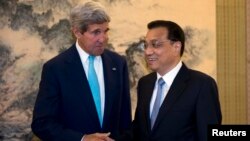U.S. Secretary of State John Kerry and other top administration officials concluded their visit to China on Thursday for the Strategic and Economic Dialogue, but did not report any breakthroughs. Their trip came at a key moment in U.S. China relations which have been tested by many events over the last year.
Common ground
In his closing statement Kerry said China and the U.S. found common ground on climate change, nuclear non-proliferation, North Korea and the importance of the rule of law among other issues.
For the world's two biggest economies, finding common ground on important issues has been a struggle, and Xiaohe Cheng, a Professor of International Relations at Renmin University, says Kerry’s visit came at a crucial time.
“I think China realized it needs to stabilize its relationship with the United States, and I think it realized this is a good opportunity to stabilize its relationship with the United States,” Xiaohe Cheng said.
More hacking allegations
U.S. China relations were again tested this week, with new media reports that Chinese hackers tried to infiltrate databases containing the personnel files of U.S. government employees. China denied the charge. Beijing had already canceled a working group due to take place this week on cyber security issues. That move was in response to a U.S. decision to indict five Chinese military officers for launching cyber attacks on American institutions.
China’s territorial claims have also roiled Sino-U.S. relations over the last year. China’s declaration of an air defense zone over waters contested with Japan and its construction of a billion dollar oil rig in the South China Seas inspired protests from its neighbors and the United States.
Fostering positive relations
Despite all of the tensions, Chinese state-backed media coverage of the meetings this week was mostly positive, with the People’s Daily writing that officials “made positive achievements and released important information for improving and developing U.S.-China relations.” The newspaper went on to state that the “people-to-people exchange has also consolidated the foundation of U.S.-China friendship.”
While few concrete achievements were announced at the meetings’ conclusion, Cheng said they were likely constructive.
“I walked away with the strong impression that China and the U.S. relationship would not be so bad as we had thought and may improve a little bit because in Xi Jinping’s speech he attached great importance on China and U.S. relations,” he stated.
Still, China’s increasingly assertive stance in foreign affairs, particularly over its territorial claims, may further challenges bilateral ties. Cheng said territorial disputes that were once between China and its neighbors now involve the United States. Inside China, some observers blame the U.S. for attempting to contain and encircle China. Outside China, analysts blame the increased tensions on China’s aggressive actions in disputed waters, such as its deployment of a massive oil rig offshore Vietnam.
“These are issues between China and some its neighbor nations, but they have come more to do with the China U.S. relations, because the U.S. as a third party is deeply involved with these issues,” explained Xiaohe Cheng.
The next high-level meeting between the two countries' leaders is expected to be in November, when President Barack Obama is scheduled to attend the APEC Economic Leaders' meeting.




